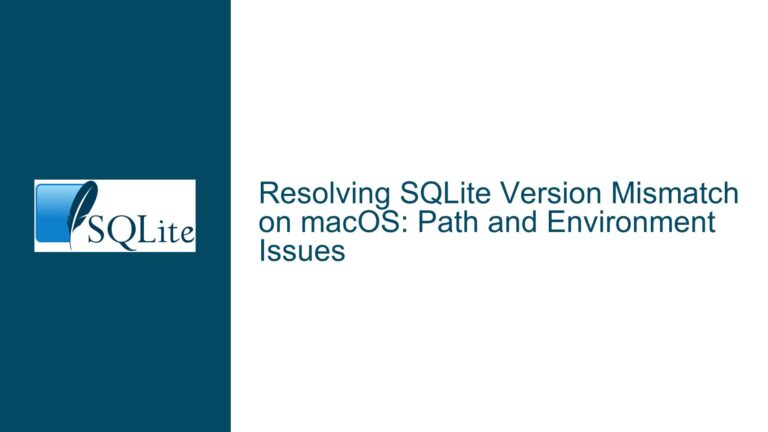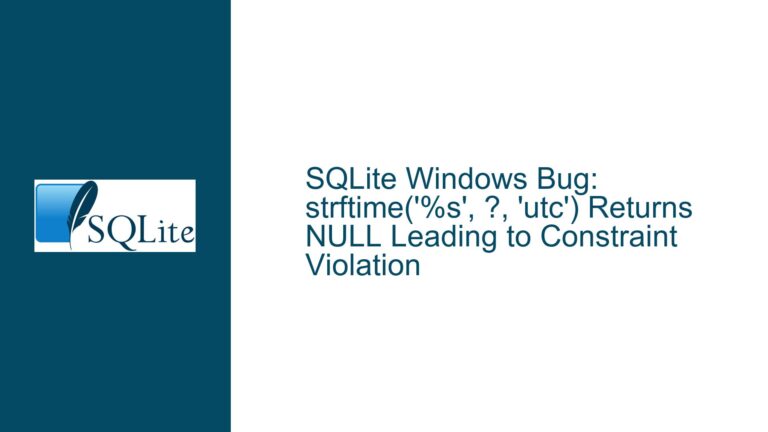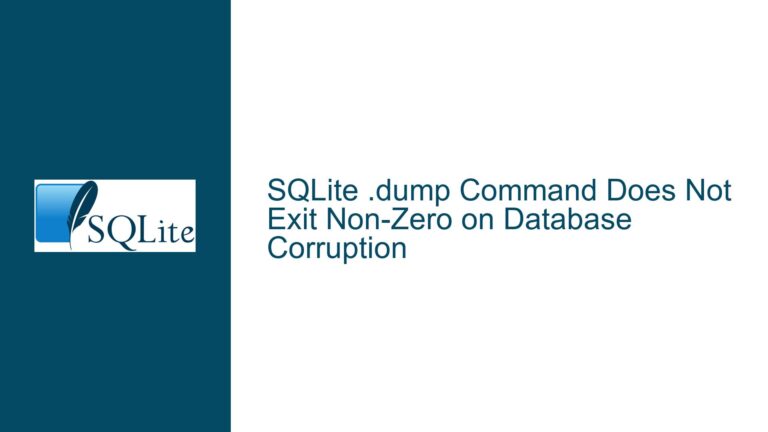Seeking SQLite Mustache JSON Templating Extensions & Comprehensive List
Integrating Mustache Templating with SQLite JSON Functions: Challenges & Community-Driven Solutions
The integration of Mustache templating with SQLite’s native JSON functions presents a unique challenge for developers seeking to streamline data formatting workflows. While SQLite’s built-in printf and string formatting utilities are powerful, they lack the readability and flexibility of named placeholders offered by templating systems like Mustache. This discussion highlights the absence of a widely adopted Mustache extension for SQLite and explores broader questions about the availability of curated extension repositories. Below, we dissect the technical hurdles, evaluate existing solutions, and provide actionable steps for developers facing similar challenges.
The Limitations of SQLite’s Native String Formatting for Complex Templating
SQLite’s printf function and related string formatting tools are foundational for basic data interpolation. However, their syntax (%s, %d, etc.) becomes unwieldy when handling nested JSON structures or multi-layered templating tasks. Consider a scenario where a developer needs to generate HTML or XML output from a JSON dataset stored in SQLite. Using printf, the query might resemble:
SELECT printf('<div class="%s">%s</div>', json_extract(data, '$.class'), json_extract(data, '$.content')) FROM documents;
While functional, this approach requires repetitive calls to json_extract and manual concatenation of placeholders. Mustache’s syntax, with its support for sections, variables, and partials, would allow for cleaner templates:
<div class="{{class}}">{{content}}</div>
The absence of a Mustache extension forces developers to either:
- Preprocess Data: Extract JSON fields into temporary tables or CTEs, then apply
printfformatting. - Postprocess Results: Use external scripting languages (Python, JavaScript) to apply templates after query execution.
- Compromise on Readability: Accept verbose SQL queries with cascading
json_extractcalls.
This limitation is particularly acute in environments where SQLite is used as an embedded database (e.g., mobile apps, IoT devices), as external processing introduces latency and dependency overhead.
Scattered Extension Ecosystem & the Quest for a Mustache Implementation
SQLite’s lightweight design and public domain licensing encourage a decentralized ecosystem of extensions. While this fosters innovation, it also complicates discoverability. The discussion highlights two primary issues:
- No Centralized Repository: Unlike PostgreSQL’s PGXN or MySQL’s Enterprise Extensions, SQLite lacks a canonical registry. Extensions are scattered across GitHub, personal blogs, and forum posts.
- Varying Quality & Maintenance: Many extensions are experimental, platform-specific, or abandoned. For instance, the
sqlite-guiproject’s experimental Inja-based templating extension (GitHub link) demonstrates promise but lacks documentation and stability guarantees.
The Mustache templating extension specifically remains elusive. The mustach C library (GitLab link) provides a potential foundation, but integrating it with SQLite requires expertise in SQLite’s C API, extension packaging, and template engine design. Key technical barriers include:
- Memory Management: SQLite extensions must carefully manage memory to avoid leaks, especially when processing large JSON datasets.
- Context Handling: Mustache’s context-aware templates (e.g., iterating over arrays) require tight integration with SQLite’s JSON1 extension.
- Error Propagation: Gracefully handling template syntax errors or missing variables without crashing the SQLite process.
Leveraging Existing Extensions, Custom Development & Community Resources
Step 1: Evaluate Alternatives to Mustache Templating
Before committing to a Mustache extension, explore SQLite’s native JSON and string functions:
- JSON1 Extension: Use
json_object,json_array, andjson_group_arrayto construct structured outputs.SELECT json_object('class', json_extract(data, '$.class'), 'content', json_extract(data, '$.content')) FROM documents; - Nested
printf: Chainprintfcalls for multi-step formatting.SELECT printf('<div>%s</div>', printf('<span class="%s">%s</span>', class, content)) FROM (SELECT json_extract(data, '$.class') AS class, json_extract(data, '$.content') AS content FROM documents);
Step 2: Adopt Community-Extended Functionality
- SQLean Ecosystem: The SQLean project bundles 23 extensions, including regex (
regexp_replace), compression (zipfile), and statistical functions. While it doesn’t include Mustache templating, itsfileioandcryptoextensions can simplify pre/post-processing workflows. - SQLite-GUI’s Inja Extension: The experimental Inja extension (GitHub) allows procedural SQL/template mixing. Example:
SELECT inja_render('<div>{{ class }}</div>', json('{"class": "highlight"}'));Caveats:
- Requires compiling from source.
- Limited to environments supporting C++17.
- No transaction safety guarantees.
Step 3: Develop a Custom Mustache Extension
For developers committed to Mustache integration, follow these steps:
Clone & Build the Mustach Library:
git clone https://gitlab.com/jobol/mustach.git && cd mustach make && sudo make install # Installs libmustach.aCreate a SQLite Extension Skeleton:
#include <sqlite3ext.h> SQLITE_EXTENSION_INIT1 #include <mustach.h> static void mustach_render(sqlite3_context *ctx, int argc, sqlite3_value **argv) { const char *template = (const char*)sqlite3_value_text(argv[0]); const char *json_data = (const char*)sqlite3_value_text(argv[1]); // Implement Mustach rendering here sqlite3_result_text(ctx, rendered_output, -1, SQLITE_TRANSIENT); } int sqlite3_extension_init(sqlite3 *db, char **pzErrMsg, const sqlite3_api_routines *pApi) { SQLITE_EXTENSION_INIT2(pApi); sqlite3_create_function(db, "mustach", 2, SQLITE_UTF8, NULL, mustach_render, NULL, NULL); return SQLITE_OK; }Cross-Platform Compilation:
Usegccwith SQLite amalgamation:gcc -fPIC -shared mustach_extension.c -o mustach.so -I/path/to/sqlite3 -lmustachTesting & Optimization:
- Validate memory usage with
valgrind. - Benchmark performance using the
.timercommand insqlite3CLI.
- Validate memory usage with
Step 4: Contribute to Community Repositories
To mitigate future discoverability issues:
- Fork SQLean: Add your Mustache extension to a SQLean fork, ensuring it meets the project’s coding standards.
- Publish on GitHub/GitLab: Include detailed documentation, example queries, and precompiled binaries for major platforms.
Step 5: Mitigate Risks with Experimental Extensions
When using third-party extensions like the Inja-based templating:
- Isolate in Temp Databases:
ATTACH DATABASE ':memory:' AS templating; .load ./inja_extension CREATE TEMP VIEW rendered AS SELECT inja_render(template, data) FROM templates; - Enable Core Dumps: For debugging crashes, configure your OS to generate core dumps (
ulimit -c unlimited).
Final Recommendations
- Adopt SQLean for Core Extensions: Prioritize battle-tested extensions like
sqlean’sregexporcryptobefore venturing into experimental territory. - Hybrid Templating: Combine SQLite’s JSON functions with lightweight client-side templating (e.g., JavaScript’s
JSON.parse+ Mustache.js). - Advocate for Centralization: Petition the SQLite Consortium or community leaders to establish an extension registry with CI/CD pipelines for quality assurance.
By methodically evaluating existing tools, judiciously extending SQLite’s capabilities, and contributing back to the community, developers can overcome the current fragmentation and unlock SQLite’s full potential as a JSON-processing engine.






